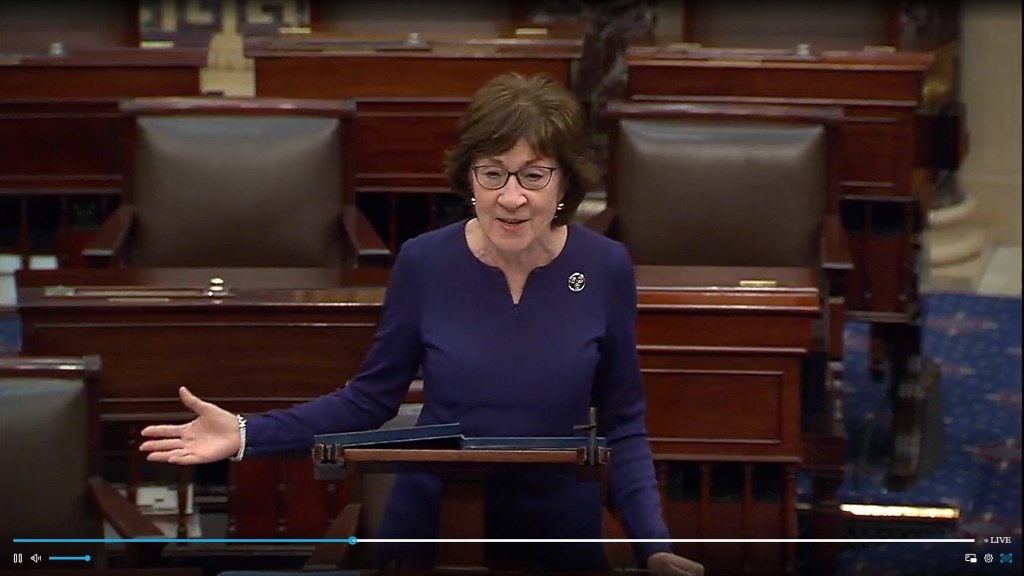Maine’s congressional delegation was split Friday over a stopgap funding bill that would prevent a federal government shutdown on Oct. 1.
Republicans were pushing a proposal to largely maintain existing spending levels through most of November, while adding $88 million for security for federal officials in the wake of last week’s assassination of prominent right-wing activist Charlie Kirk.
Senate Democrats blocked that bill. Their counterproposal, which included major policy changes to Trump’s One Big Beautiful Bill, also failed on Friday.
Lawmakers have until midnight on Sept. 30 to reach a compromise and avoid a shutdown.
Sen. Susan Collins, R-Maine, blasted Democrats for opposing the Republican short-term funding bill and instead pushing an ill-fated proposal with “poison pills” that has no chance of passing.

Collins, who leads the Senate Appropriations Committee, urged Senate Democrats to support a one-month extension of existing funding levels to allow lawmakers to finalize a package of annual spending bills and bring them to the floor.
“I urge my colleagues to abandon this brinkmanship that does not serve the American people well — that is unworthy of this Senate — and adopt this straightforward bill,” Collins said in a floor speech.
The Republican bill was approved earlier Friday by the House, with Maine’s Rep Chellie Pingree, D-1st District, opposed and Rep. Jared Golden, D-2nd District in support.
Golden was the only House Democrat to vote for the bill.
Sen. Angus King, I-Maine, voted with Senate Democrats.
The political battle over the funding bill brings into focus key differences between Republicans and Democrats ahead of next year’s midterm elections.
Golden is facing another tough reelection in a district that voted for Trump in 2024. He’s being challenged by former Republican Gov. Paul LePage.
Collins also faces a tough reelection campaign. She’s been identified by political observers as the most vulnerable Senate Republican, since she’s her party’s only member representing a state won by former Vice President Kamala Harris last year.
Senate Republicans needed to win over seven Democrats to reach the 60 votes needed to avoid a shutdown on Oct. 1 and fell well short, although eight Senators were absent Friday. No additional votes are expected until next week.
Senate Minority Leader Chuck Schumer warned that Democrats were unified in opposition and would offer a counterproposal that would reverse steep cuts to Medicaid made in Trump’s One Big Beautiful Bill and extend Obamacare subsidies slated to expire at the end of the year. It also would have prohibited Trump from rescinding spending approved by Congress.
Collins blamed Democrats for Congress’ failure to pass annual funding bills before the end of the month. She said Schumer’s failure to hold votes on appropriations bills last year as majority leader delayed negotiations, as lawmakers focused on short-term spending bills.
“Instead of supporting a clean CR to prevent a government shutdown, congressional Democrats sadly have put forward a partisan alternative that is full of poison pill riders and significant policy changes,” she said.
Collins also noted that the Democratic proposal would eliminate a $50 billion fund for rural hospitals. But that fund, which Collins helped create, was only added to help offset a fraction of the expected revenue losses associated with the steep cuts to Medicaid.
The Democratic proposal would have reversed those cuts, which are scheduled to take effect after the 2026 midterms
Pingree defended the Democratic proposal in a written statement, saying that enrollment in health plans under the Affordable Care Act begin on Nov. 1 and families can’t wait until December to know how much it will cost.
“This uncertainty, on top of historic cuts to Medicaid included in the Big Ugly Bill, is going to make people sicker and further destabilize our state’s health care system,” she said.
“I will not support any spending bill that fails to address this health care crisis and makes life more expensive for the people of Maine. It’s time for Republicans to abandon their partisan games, work with Democrats, and govern responsibly.”
Golden, however, said in a written statement that Democrats have no choice but to support the bill, since Republicans control the White House and both chambers of Congress.
“There’s no path forward on health care without GOP support,” said Golden, who is working on a bipartisan basis to extend the ACA tax credits. “This clean, short-term CR will keep the lights on and give us more time to set policies and funding levels for the future.”
Both Golden and Collins said a shutdown would have negative impact across the country, especially in Maine, where more than 11,000 federal workers would either be furloughed or required to work without pay.
Both highlighted the impact on Acadia National Park, which would be forced to furlough workers and close facilities amid peak foliage season, sending ripple effects throughout the local economy.
King did not issue a statement explaining his vote against the Republican bill and in support of the Democratic proposal. His spokesman, Matthew Felling, said in a written statement, “Senator King today voted to avoid a government shutdown and will be engaged in negotiations in the days ahead.”

We invite you to add your comments. We encourage a thoughtful exchange of ideas and information on this website. By joining the conversation, you are agreeing to our commenting policy and terms of use. More information is found on our FAQs. You can update your screen name on the member's center.
Comments are managed by our staff during regular business hours Monday through Friday as well as limited hours on Saturday and Sunday. Comments held for moderation outside of those hours may take longer to approve.
Join the Conversation
Please sign into your CentralMaine.com account to participate in conversations below. If you do not have an account, you can register or subscribe. Questions? Please see our FAQs.